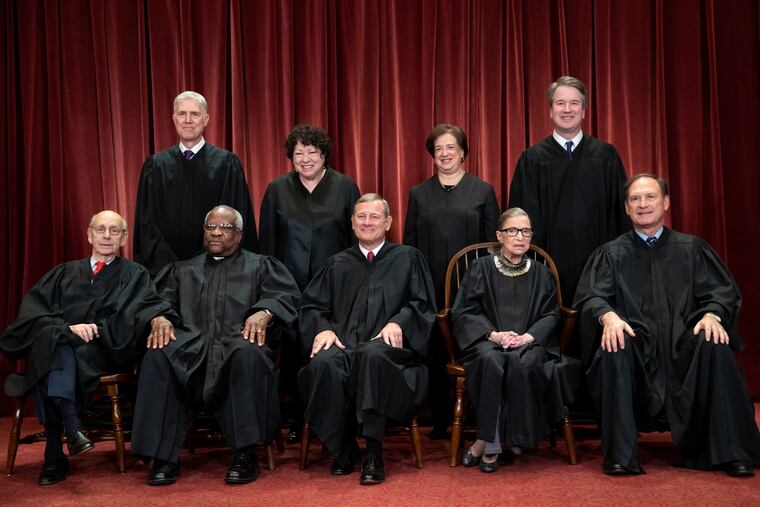LGBTQ rights, abortion, immigration, guns: Supreme Court’s term could reshape life in Philadelphia | Editorial
Four key cases the Court will hear-- and what they mean for the region

The newly conservative majority on the U.S. Supreme Court waited only for its second term to weigh in on cases that have the potential to cement its ideological shift to the right since the confirmations of Neil Gorsuch and Brett Kavanaugh. The court will decide on cases involving abortion, guns, immigration, LGBTQ rights, Obamacare, and the separation of church and state.
These cases will not only help define the court, but will possibly reshape life in the United States for years to come. It’s important to remember that we live in a time where states and cities play a more critical role than ever in ensuring basic civil rights and safety. Here is a review of a few of the cases and how they might impact our region.
LGBTQ discrimination
Lawyers for a Long Island skydiving instructor and a child-welfare services coordinator in Georgia, both of them gay men, and a transgender woman working as a funeral director in Michigan argue that the plaintiffs, all of whom were fired, would not have lost their jobs “but for” their sex. In other words, Title VII of the Civil Rights Act of 1964, which clearly prohibits discrimination “because ... of sex” but makes no mention of homosexuality, bisexuality, or transgender identity, applies because the sex of each individual plaintiff was in some way at issue in the terminations.
What could this mean to our region? New Jersey is among the 27 states that have enacted anti-LGBT discrimination bans in public and private employment; Philadelphia, Pittsburgh, and a few other local jurisdictions have put in place such prohibitions, but Pennsylvania hasn’t -- despite being first in the nation to bar discrimination against gays and lesbians in state government employment, way back in 1975. Local bans would likely be upheld if the court ruling allowed discrimination.
» READ MORE: U.S. Supreme Court appears split over LGBT people’s rights
Abortion
In 2016, the Supreme Court struck down a Texas law that tightly regulated clinics that provide abortion with cumbersome requirements that do not address any actual patient health or safety needs. These types of regulations are prevalent all over the country, including Pennsylvania. But in the 2016 decision, the court found that Texas went too far and that its law imposed an “undue burden" by requiring that abortion providers have admission privileges in nearby hospitals. Now the court will review a Louisiana law that is almost identical to the law the same court found unconstitutional in 2016 -- including a 30-mile admission privileges requirement.
What could this mean to our region? The desire of Republican lawmakers in Harrisburg to restrict access to abortion in Pennsylvania is no secret. By reconsidering the definition of “undue burden,” the Supreme Court could be giving ideas to anti-choice lawmakers. Thankfully, Gov. Tom Wolf has not been shy vetoing legislation that infringes on a woman’s right to choose -- in this time of assault on reproductive rights, his leadership on this issue is critical.
» READ MORE: John Roberts isn’t yet ready to ‘jolt’ the legal system on abortion | Opinion
» READ MORE: Supreme Court to review ruling on Louisiana abortion law
Immigration
After Congress failed to pass the DREAM Act that would have protected undocumented children who were not born here, in 2012, President Barack Obama created the Deferred Action for Childhood Arrivals program via executive order. The program grants temporary status to undocumented immigrants who arrived in the United States before 2007 and before they were 16 years old. In 2017, President Donald Trump ended DACA, putting the future of nearly 800,000 “DREAMers” in limbo -- or worse, in the hands of a divided Congress. Trump’s administration said that it is reversing DACA because the program was illegal, an argument that lower courts rejected.
What could this mean to Philadelphia? Despite the fact that Mayor Jim Kenney and Council have embraced pro-immigrant policies, unfortunately, there is no way for Philadelphia or Pennsylvania to grant status to the roughly 5,000 DREAMers living in the commonwealth. DREAMers are not kids anymore. They are our peers, classmates in college, lawyers, doctors, and neighbors. The harm -- human and economic -- of overturning DACA would be severe.
Guns
The last time the Supreme Court took up a major gun case was more than a decade ago in 2007. In the Heller decision, the court ruled individuals have the right to own a gun in their home but that right is not unlimited. The court did not enumerate or define what limitations are appropriate. The court accepted a challenge of New York City’s law that restricts travel with a gun. In an effort to make the court drop the case, NYC relaxed its law, but to no avail.
What could this mean to Philadelphia? Harrisburg not only refuses to enact meaningful gun-control laws, but lawmakers won’t even let Philadelphia set its own gun regulations. If the Supreme Court rules that restrictions on travel with guns are unconstitutional, Pennsylvania’s gun control could become even more lax -- opening the door for a world in which you would see people legally carrying a gun into a Wawa.
» READ MORE: By advancing mandatory minimums and more preemption, Harrisburg moves backward on gun violence | Editorial